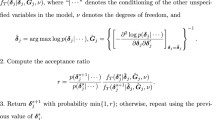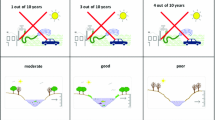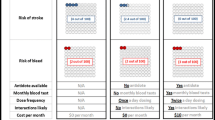Abstract
With the growing interest in the topic of attribute non-attendance, there is now widespread use of latent class (LC) structures aimed at capturing such behaviour, across a number of different fields. Specifically, these studies rely on a confirmatory LC model, using two separate values for each coefficient, one of which is fixed to zero while the other is estimated, and then use the obtained class probabilities as an indication of the degree of attribute non-attendance. In the present paper, we argue that this approach is in fact misguided, and that the results are likely to be affected by confounding with regular taste heterogeneity. We contrast the confirmatory model with an exploratory LC structure in which the values in both classes are estimated. We also put forward a combined latent class mixed logit model (LC-MMNL) which allows jointly for attribute non-attendance and for continuous taste heterogeneity. Across three separate case studies, the exploratory LC model clearly rejects the confirmatory LC approach and suggests that rates of non-attendance may be much lower than what is suggested by the standard model, or even zero. The combined LC-MMNL model similarly produces significant improvements in model fit, along with substantial reductions in the implied rate of attribute non-attendance, in some cases even eliminating the phenomena across the sample population. Our results thus call for a reappraisal of the large body of recent work that has implied high rates of attribute non-attendance for some attributes. Finally, we also highlight a number of general issues with attribute non-attendance, in particular relating to the computation of willingness to pay measures.
Similar content being viewed by others
Notes
For MNL, point estimates are used, for exploratory LC, all four combinations of two coefficients are used in a weighted average of the resulting four ratios, while, in the MMNL models, we obtain a ratio of two distributions.
References
Alemu, M.H., Mørbak, M.R., Olsen, S.B., Jensen, C.L.: Attending to the reasons for attribute non-attendance in choice experiments. Paper presented at the second international choice modelling conference, ICMC, Oulton Hall, Leeds (2011)
Bujosa, A., Riera, A., Hicks, R.: Combining discrete and continuous representation of preference heterogeneity: a latent class approach. Environ. Resour. Econ. 47(4), 477–493 (2010)
Cameron, T., DeShazo, J.: Differential attention to attributes in utility-theoretic choice models. J. Choice Model. 3(3), 73–115 (2011)
Campbell, D., Hensher, D., Scarpa, R.: Cost thresholds, cut-offs and sensitivities in stated choice analysis: identification and implications. Resour. Energy Econ. 34(3), 396–411 (2012)
Campbell, D., Hensher, D.A., Scarpa, R.: Non-attendance to attributes in environmental choice analysis: a latent class specification. J. Environ. Plan. Manag. 54(8), 1061–1076 (2011)
Campbell, D., Lorimer, V., Aravena, C., Hutchinson, W.G.: Attribute processing in environmental choice analysis: implications for willingness to pay. In: 84th Annual Conference, 29–31 March 2010, p. 91718. Agricultural Economics Society, Edinburgh, Scotland (2010)
Carlsson, F., Kataria, M., Lampi, E.: Dealing with Ignored attributes in choice experiments on valuation of Sweden’s environmental quality objectives. Environ. Resour. Econ. 47(1), 65–89 (2010)
Collins, A., Rose, J., Hensher, D.: The random parameters attribute non-attendance model. Paper presented at the 13th international conference on travel behaviour research. TBR, Toronto (2012)
Doornik, J.A.: Ox: An Object-Oriented Matrix Language. Timberlake Consultants Press, London (2001)
Greene, W.H., Hensher, D.A.: Revealing additional dimensions of preference heterogeneity in a latent class mixed multinomial logit model. Applie 45(14), 1897–1902 (2013)
Hensher, D.A.: Attribute processing, heuristics and preference construction in choice analysis. In: Hess, S., Daly, A.J. (Eds.), State-of Art and State-of Practice in Choice Modelling: Proceedings from the Inaugural International Choice Modelling Conference, Chap. 3, pp. 35–70. Emerald, Bingley, UK (2010)
Hensher, D.A., Greene, W.H.: Non-attendance and dual processing of common-metric attributes in choice analysis: a latent class specification. Empir. Econ. 39(4), 413–426 (2010)
Hensher, D.A., Rose, J.M., Greene, W.H.: The implications on willingness to pay of respondents ignoring specific attributes. Transportation 32(3), 203–222 (2005)
Hensher, D.A., Rose, J.M., Greene, W.H.: Inferring attribute non-attendance from stated choice data: implications for willingness to pay estimates and a warning for stated choice experiment design. Transportation 39(2), 235–245 (2012)
Hess, S., Hensher, D.: Making use of respondent reported processing information to understand attribute importance: a latent variable scaling approach. Transportation, in press. (2012)
Hess, S., Hensher, D.A.: Using conditioning on observed choices to retrieve individual-specific attribute processing strategies. Transp. Res. B 44(6), 781–790 (2010)
Hess, S., Rose, J.M.: A latent class approach to recognising respondents’ information processing strategies in SP studies. Paper presented at the Oslo workshop on valuation methods in transport planning, OWVM, Oslo (2007)
Hess, S., Train, K., Polak, J.W.: On the use of a modified Latin hypercube sampling (MLHS) method in the estimation of a mixed logit model for vehicle choice. Transp. Res. B 40(2), 147–163 (2006)
Hole, A.R.: A discrete choice model with endogenous attribute attendance. Econ. Lett. 110(3), 203–205 (2011a)
Hole, A.R.: Attribute non-attendance in patients’ choice of general practitioner appointment. Paper presented at the second international choice modelling conference, ICMC, Oulton Hall, Leeds (2011b)
Puckett, S.M., Hensher, D.A.: The role of attribute processing strategies in estimating the preferences of road freight stakeholders. Transp. Res. E 44(3), 379–395 (2008)
Rose, J.M., Hensher, D.A., Greene, W.H., Washington, S.: Attribute exclusion strategies in airline choice: accounting for exogenous information on decision maker processing strategies in models of discrete choice. Transportmetrica, forthcoming (2011)
Scarpa, R., Gilbride, T., Campbell, D., Hensher, D.A.: Modelling attribute non-attendance in choice experiments for rural landscape valuation. Eur. Rev. Agric. Econ. 36(2), 151–174 (2009)
Scarpa, R., Thiene, M., Hensher, D.A.: Monitoring choice task attribute attendance in nonmarket valuation of multiple park management services: does it matter? Land Econ. 86(4), 817–839 (2010)
Author information
Authors and Affiliations
Corresponding author
Rights and permissions
About this article
Cite this article
Hess, S., Stathopoulos, A., Campbell, D. et al. It’s not that I don’t care, I just don’t care very much: confounding between attribute non-attendance and taste heterogeneity. Transportation 40, 583–607 (2013). https://doi.org/10.1007/s11116-012-9438-1
Published:
Issue Date:
DOI: https://doi.org/10.1007/s11116-012-9438-1




